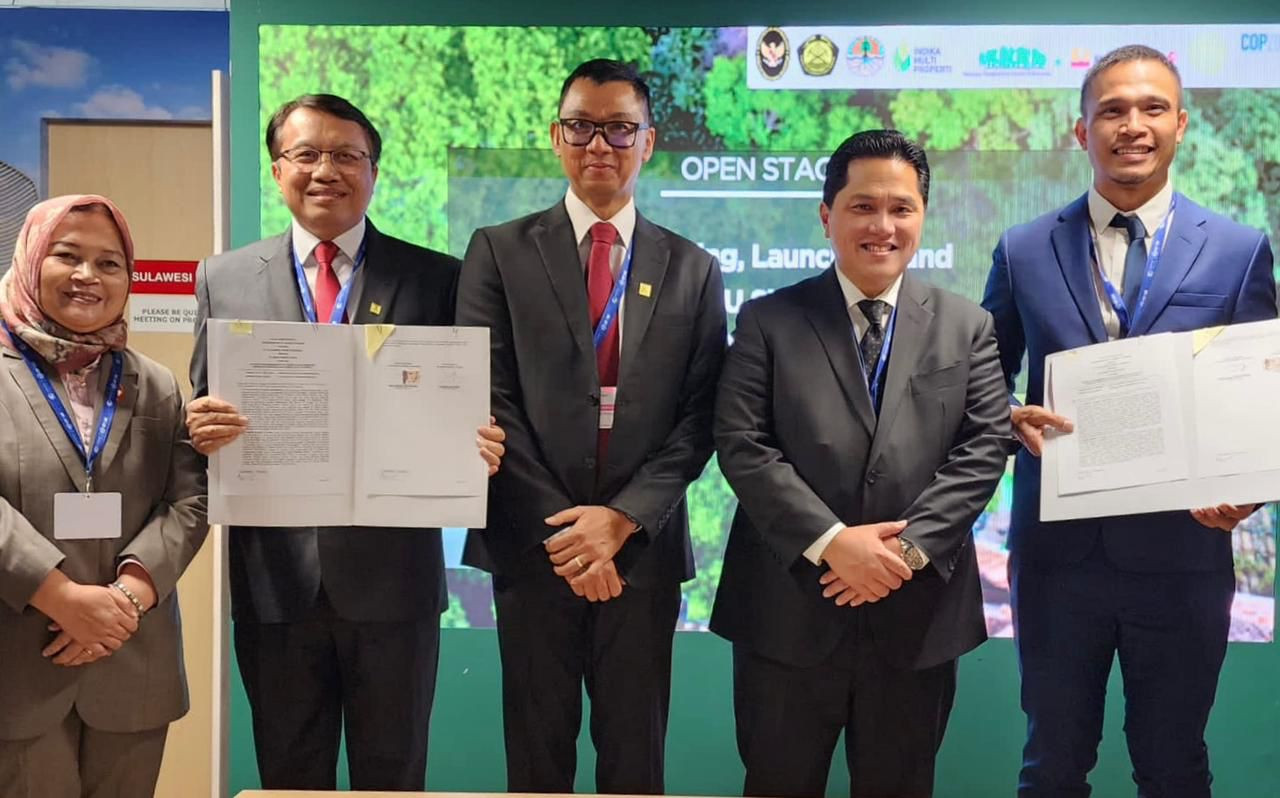Popular Reads
Top Results
Can't find what you're looking for?
View all search resultsPopular Reads
Top Results
Can't find what you're looking for?
View all search resultsPLN and Coordinating Maritime Affairs and Investment Ministry launch STAB and PERTIWI
PT PLN (Persero), through its subholding PLN Energi Primer Indonesia (PLN EPI), in collaboration with the Coordinating Maritime Affairs and Investment Ministry, launches the Socio Tropical Agriculture-waste Biomass (STAB) and Primary Energy Renewable and Territorial Integrated Wisdom of Indonesia (PERTIWI) programs.
Change text size
Gift Premium Articles
to Anyone
D
ubai, Dec. 2, 2023 - PT PLN (Persero), through its subholding PLN Energi Primer Indonesia (PLN EPI), in collaboration with the Coordinating Maritime Affairs and Investment Ministry, launches the Socio Tropical Agriculture-waste Biomass (STAB) and Primary Energy Renewable and Territorial Integrated Wisdom of Indonesia (PERTIWI) programs. These initiatives aim to utilize agricultural and plantation waste for the biomass supply chain at the United Nations Climate Change Conference (COP28) in Dubai, the United Arab Emirates, on Thursday (30/11).
Acting coordinating maritime affairs and investment minister Erick Thohir, expressed that in the COP28 event, the Indonesian government was not only actively participating in preserving a sustainable environment but also demonstrating tangible actions toward achieving the net-zero emissions (NZE) target by 2060.
"I am pleased and proud that on this occasion, we are launching and signing partnerships to address the highly structured issue of climate change. The Indonesian government has developed a strategy for the implementation of decarbonization policies and ensuring a smooth energy transition to balance economic and social interests," said Erick during the memorandum of understanding (MoU) signing session at the Indonesia Pavilion of COP28.
Erick also expressed appreciation for all parties that have fully committed to collaboration and made significant contributions to realizing decarbonization in the country.
"I also appreciate all parties that have shown strong commitment to collaboration and contributing to a more environmentally friendly Indonesia. I hope this commitment can be realized and implemented as effectively as possible," emphasized Erick.
PLN president director Darmawan Prasodjo shared how the launch of this program aligned with the energy transition road map. Moreover, he said that biomass utilization was a tangible manifestation of PLN's commitment to enhancing the renewable energy mix in the country.
"The intensive Co-Firing Biomass policy is being implemented in Indonesia as a concrete step to reduce carbon emissions to achieve the NZE target by 2060 or earlier. Co-firing biomass also plays a vital role in accelerating the energy transition in the country," explained Darmawan.
He continued, stating that co-firing biomass has the advantage of the lowest levelized cost of electricity (LCOE) compared with other renewable energy sources. Moreover, local communities would also play a crucial role in providing biomass raw materials. In other words, co-firing biomass will not only accelerate the energy transition but also stimulate the economy by creating massive job opportunities.
PLN EPI president director Iwan Agung Firstantara explained that STAB was a type of biomass derived from agricultural waste, where the production process would directly involve farming communities. Raw materials for STAB can include waste or residue from agricultural or plantation crops such as rice husks, straw, corn cobs, bagasse, sugarcane leaves, palm frond waste, coconut residue, empty oil palm fruit bunches, plant pruning residues and other waste products.
"As a tropical country with an agrarian society, we see a lot of agricultural waste that has been traditionally dumped or burned to clear land. We see significant potential in this, so we continue to innovate on how to utilize waste that was previously unproductive and disruptive, turning it into clean energy and even creating new economic value for farmers in Indonesia," said Iwan.
Iwan said that since the second half of 2023, PLN EPI had been utilizing STAB from various types of waste, including sugarcane bagasse and pelletized oil palm empty fruit bunches. Therefore, he was optimistic that through cross-ministerial and state-owned enterprise partnerships, the acceleration of the STAB biomass could be further promoted. He added that, in line with the government's commitment to achieving the co-firing target by 2025, the projected demand for biomass from PLN was expected to increase sharply by 10.2 million tonnes or 300 percent, providing 12.7 terawatt hours (TWh) of clean energy.
In addition to STAB, this MoU also introduces PERTIWI, a type of biomass produced from branches and waste from food production such as sago. As a first step, the PERTIWI program will be developed in Riau province.
In that region, there are approximately 80 sago mills with the potential for waste, such as sago pulp and peel, exceeding 200,000 tonnes per year. So far, sago pulp has been disposed of in rivers or the sea or simply dumped on the land. Meanwhile, the sago peel is burned for sago drying boilers, with the ash discarded.
"Therefore, considering the vast potential of STAB and PERTIWI, PLN EPI is optimistic about making a maximum contribution to emission reduction efforts while simultaneously improving the welfare of the community by optimizing the characteristics and uniqueness of Indonesia as a nation," concluded Iwan.
In addition to the launch of STAB and PERTIWI, at the same event, PLN EPI also partnered with several entities to collaborate in maintaining the biomass supply chain, marked by the signing of MoUs with PT Sinar Energi Utama, PT Elektrika Konstruksi Nusantara, PT Aswattha, PT Mentari Biru Energi and PT Hartana Tamita.










